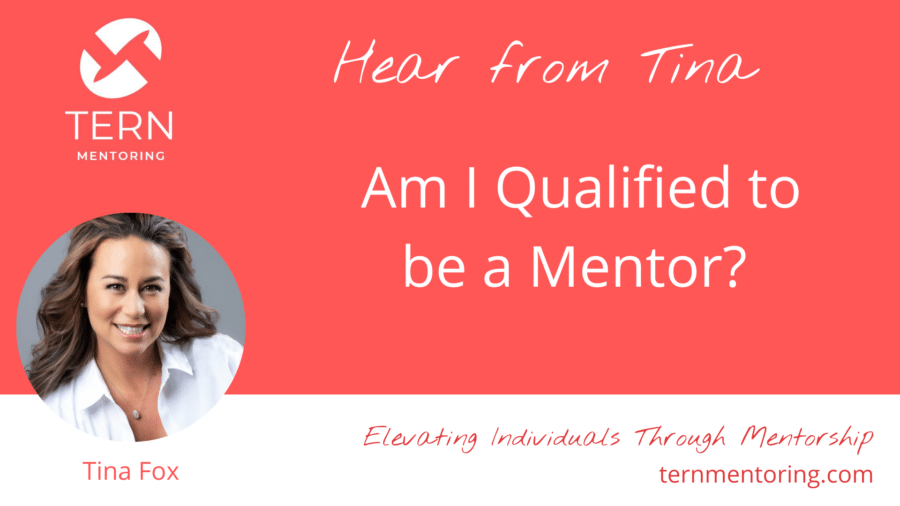Hi, I’m Tina Fox, the creator and CEO of TERN Mentoring. If you are reading this, it’s probably because you have some interest in mentoring, and we thank you for that interest. The number one question I’m often asked when a mentor is considering becoming a mentor in this program is, “Am I qualified to be a mentor?” I almost chuckle just a little bit when I get that question because your ask and interest tells me two things that lead me to believe that you indeed are qualified to be a great mentor. Simply by asking, you’ve demonstrated humility and curiosity, a couple of key cornerstones in mentoring.
Now, I have found that most great mentors, they come with a mentor’s heart, and they participate in thinking more about others than themselves. A person’s curiosity about whether or not they have qualifications to become a mentor, that lines up pretty nicely with an interest in learning. So it all works out great. Now, as a mentor myself, what I’ve learned is that when mentees join the TERN Mentoring program, they’re keen on the following things: they want to connect, they want to ask questions, they want to listen, and they want to learn. And so our role as mentors is really to create a welcoming and enriching environment to do so.
Here are my top 10 tips to support your conversation, and I’m pretty confident that in being able to do these things, you are well on your way to being a magnificent mentor.
Number one, smile. It’s probably the most welcoming human gesture.
Number two, ask open-ended questions. Open-ended questions tend to draw more information and yield a more robust conversation.
Three, active listening. That also requires full presence in the conversation, certainly eye contact, and all of our nonverbal cues go a long way in building a connection with the other person. Now, there’s a saying that I’ve often stated and I fully believe, and that is that all people want to be heard and know what they said matters.
Four, echoing. Now, one of the best ways that I’ve learned to do this is to recap or paraphrase what the other person has said, certainly for clarification and understanding. Now, this does not constitute agreement, however, it signals to that other person that you’ve heard them and both of you’re on the same page as to what was said and what you’ve heard.
Now, interestingly, being a part of many different conversations where this art of echoing has supported me in deeper discussions, the other person sometimes in hearing themselves for the first time comes to a realization about themselves and this results in positive change and more. So the art of echoing is a great one that you can use as a mentor.
Fifth, encourage what you believe to be positive. When you hear somebody else speaking and you think it’s a great thing, make sure that you highlight and emphasize to continue to do those things.
Six, connect the dots. Also, help connect the dots in what you hear the mentor saying and what you know to be in your own experience or that of what you’ve learned. This is really where they’re trying to draw a connection with you, if they’re going through something, they want to know that perhaps you’ve done something similar, maybe have the same fear, a hesitation, or you have knowledge in something because you’ve studied it. They want to hear from you and what that has been for you.
Seven, provide feedback. Feedback is so critical in order to help individuals get better and have things to look forward to and to work towards. This feedback should certainly be based on your own experience and wisdom, because again, that’s what they’re seeking.
Eight, reserve judgment. I always say reserve judgment. That is because nobody wants to be judged. We all make mistakes. But if you can help identify where an error is made and where potentially in the future that could be avoided, that certainly would be very helpful.
Nine, encourage the mentee to ask questions of you. Trust is formed when there is a balanced exchange of conversation.
Ten, teach your failures. And then finally, teach your failures. If there’s one thing I’ve learned about connecting with mentees is that they love to hear about my failures. It makes me more of a real person, it will make you more of a real person to that individual. They remember the failures sometimes more than they remember the successes, so don’t be afraid to be a little vulnerable and share some of the things that didn’t work because that goes a long way.
So if you can do these things, you are well on your way to being a magnificent mentor, and I hope you sign up with us at ternmentoring.com. If you have already, thank you. Many people are looking to connect with a mentor. Mentoring is a simple way to live your legacy today. Thanks again, and I’ll see you online or in-person soon.

